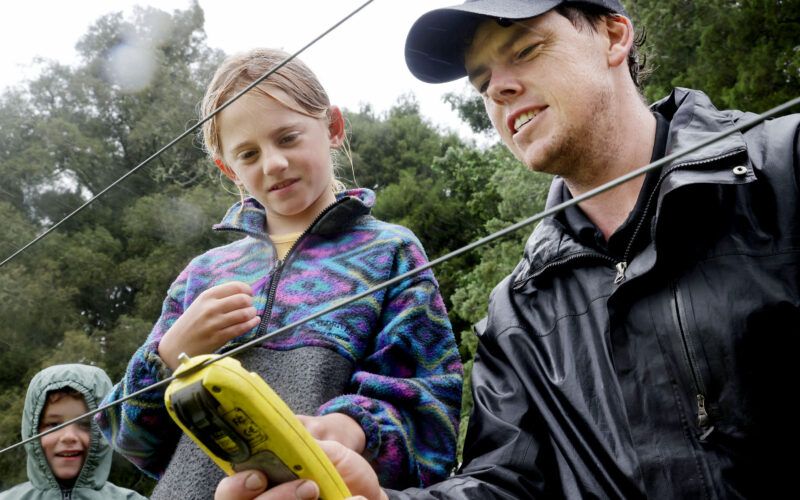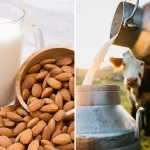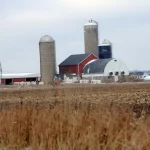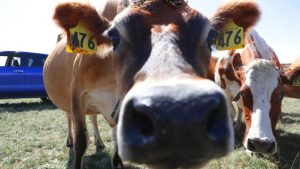
This article first appeared in our sister publication, Dairy Farmer. https://www.agrihq.co.nz/our-magazine
Running Donald’s Farm on the edge of New Zealand’s largest city allows an Auckland farmer to operate one of the country’s most unusual dairy businesses.
Owned by NZ Young Farmers (NZYF), the 63ha effective farm in Whitford is managed by Sam Waugh. It acts as both a commercial dairy farm and as an educational hub for Auckland schoolchildren to visit in order to learn about the primary sector.
For Waugh, it means combining conventional day-to-day farming with a de facto teacher’s role.
It’s a challenge he relishes.
“We don’t know of any other farm in New Zealand that’s trying to do what we do. Being so close to the city and being able to work alongside urban schools to bring kids out to a whole other world is quite a unique opportunity,” he says.
It gives him, wife Liana and son Albie an insight into living and operating a dairy farm on Auckland’s fringe that few have.
“I grew up in Manawatū and then spent most of my time after school in Canterbury. I never thought I would be living, let alone farming, in Auckland. It was never on my radar.
“Farming here has its challenges but it’s quite a unique location where you are just far enough away that you still feel like you are not in the city but we are close enough that it’s very relatable for the urban population when they do come out.”
He has a view of arguably Auckland’s most recognisable landmark out of his living room window.
“It’s quite interesting waking up every day and looking at the Sky Tower as a farmer.”
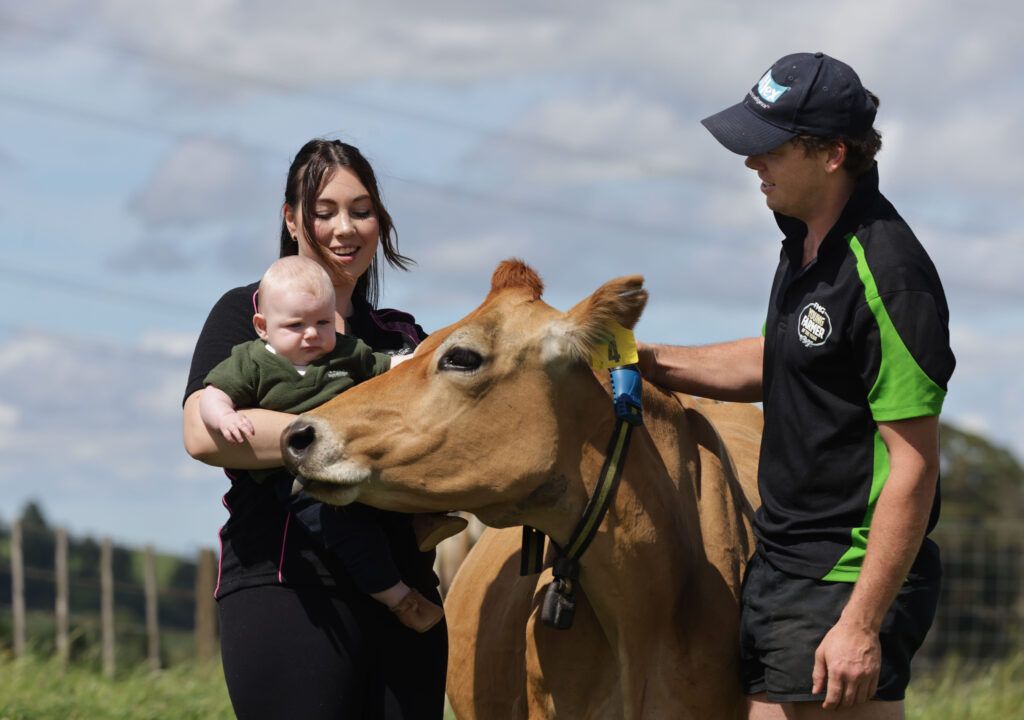
Sam, Liana & Albie + Farm.
2nd visit.
It’s also given cause for him to reflect on the so-called urban-rural divide between farmers and the urban population.
“You don’t know what you don’t know and the people visiting the farm have very rarely had the opportunity to talk to a farmer, let alone come out to a farm.
“Their knowledge isn’t there because they don’t know what they don’t know. Sometimes in the rural sector, we see the divide as a problem. I don’t see it as a divide, it’s a misunderstanding or a lack of knowledge.”
That misunderstanding also goes both ways and he questions whether farmers truly understand the needs of urban populations.
“For me, one of the things I really like about this job is being able to walk the line between the two and help bridge that understanding and knowledge.”
The 74ha farm has 11ha of retired areas and native bush, milking a 120-cow self-contained herd of mostly Jersey cows along with a small number of milking shorthorn, a legacy of the late Donald Pearson, the farm’s former owner.
He bequeathed the farm to New Zealand Young Farmers in 2018.
The generosity of Pearson’s gesture, given the land value of the farm because of its location, is not lost on Waugh.
He says Pearson was approached numerous times over the years by developers who wanted to turn the farm into lifestyle blocks.
“He was adamant that it’s not what he wanted and it’s very much a strong part of our identity and how we operate.”
Pearson knew that the understanding and knowledge of farming and how food is produced was diminishing within NZ’s urban population. He believed his farm could be used to help turn this trend around.
“It was Donald’s wish that the farm remain as an operational farm and that it be used to connect communities with farming,” Waugh says.
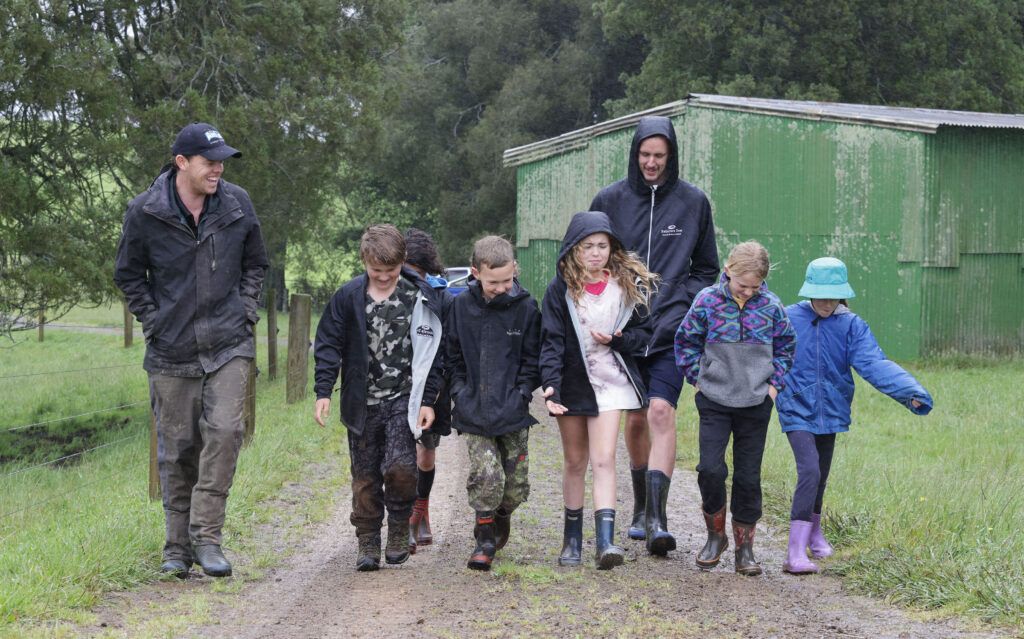
Whitford.
It’s a commercial farm, but its focus is split between profitability and education, with the farm used as an outdoor classroom for schoolchildren.
“His focus for the farm was connecting communities with farming and that’s what we’re starting to develop,” Waugh says.
“What we would like to do long term is to have around 5000 students a year on the farm and connect with students multiple times during their schooling, from primary into secondary and potentially into tertiary. Currently, our focus is on the primary and secondary age groups.”
He is in his third season running the farm. It is a sole position apart from a relief worker who covers for him on his days off.
After leaving university, Waugh worked as a farm consultant in Canterbury while also sitting on the NZYF national board.
It was during this time that Pearson first began discussions with the organisation around donating his farm. However, for Sam and Liana an OE beckoned and the couple spent the next couple of years in the United Kingdom.
He had kept in touch with the board over the course of his travels and knew about the bequeathal. While on a trip home to NZ for a wedding he was interviewed for the manager’s job.
In the background of all of this was the covid-19 pandemic. Waugh initially turned down the job to travel more, but once the scale of the pandemic became clear, Sam and Liana changed their plans and moved back to NZ.
The position was still open and Sam was hired.
NZYF set up the farm as a not-for-profit entity and as a wholly owned subsidiary with a board of directors chaired by Hauraki Plains farmer Julie Pirie.
Waugh and the board meet bi-monthly for a catch-up, and he will speak informally with Pirie about farm matters about once every two weeks.
The day-to-day management is largely left to Waugh.
NZYF undertook development work following the bequeathal. Pearson had kept the farm in immaculate condition, but as he had grown older and unable to complete some of farming’s more physical tasks, areas of the farm had become rundown.
It coincided with tighter regulations around milk temperatures and effluent storage, prompting the NZYF board to improve the farm’s chiller unit in the dairy shed and upgrade its effluent system with a new lined pond installed in 2019. It has 90 days of storage.
Plans are underway to improve the farm’s raceway so it can handle buses for school visits, and to construct a new building that will act as an educational centre during those visits.
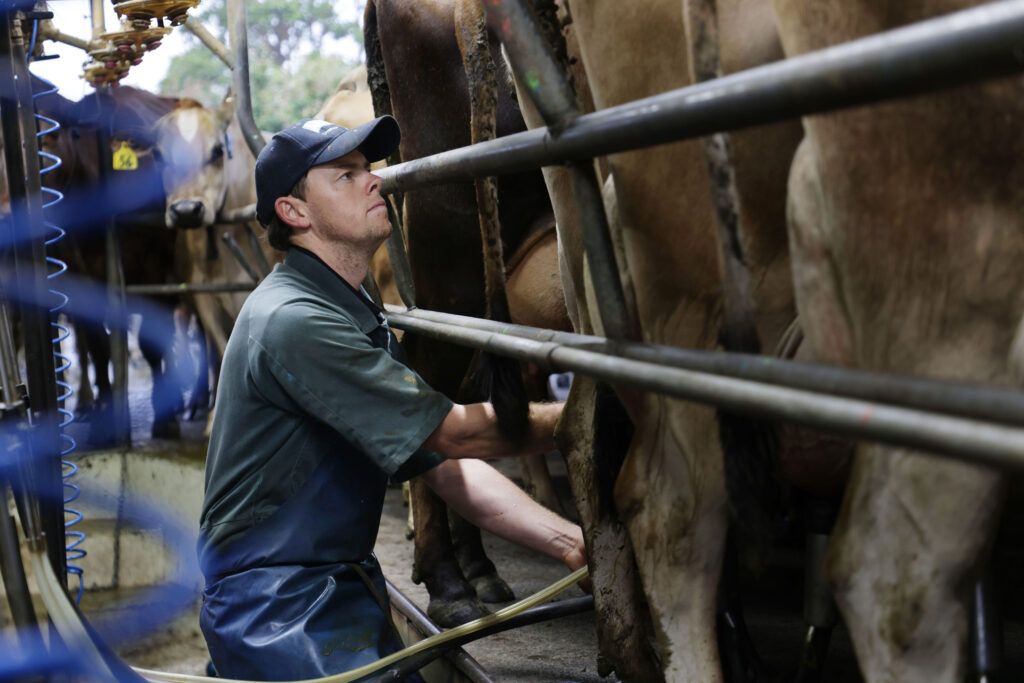
Whitford.
A lot of the older pine and macrocarpa trees in the farm’s gullies have been harvested. The land will be re-fenced and riparian planted.
Running through the farm are two tributary waterways that feed into the Papakura stream. Fences alongside these waterways have been replaced with a 5m buffer that will be planted in natives. A 2.8ha block and a 0.5ha block of native bush on the farm have been retired and will be extended over time.
“One of our key goals is around water quality and we would like to make sure it’s at a drinkable state when it leaves the farm,” Waugh says.
It will also be an educational focal point for the school visits.
The herd is milked twice a day through spring before switching to once-a-day in mid-December when the summer dry sets in.
“We have a very heavy clay soil that gets very wet in the winter and when its gets hot in the summer it gets very dry and it presents some challenges.
“The reason for once-a-day is threefold. It protects us if it does get very dry, frees me up so I can do more maintenance and development work around the farm as well as the allowing more time for the educational workload. Over the summer and autumn months we’ll try and do a lot more of our visits.”
To supplement the pasture, around 10ha of chicory is used as a summer feed crop and a small amount of meal is also brought in. Waugh also tries to get at least one cut of baleage through spring to feed out.
“Chicory is a big tool for us in summer, which helps us extend the round and provide a really high-quality feed over the drier months.”
Waugh says one of his main focuses since becoming manager is pasture renewal.
“In the autumn we’ll re-sow the chicory into new grass and in the last couple of seasons, with that chicory coming out, we have started to get a fair bit of new grass in. We have seen some good gains from that and it’s making a big difference in our production.”
Last season the farm produced 36,942kg milk solids and this season is aiming for 37,000kg MS. At this stage, production is slightly ahead of target.
The farm’s soil type and pasture variability are reflected in its low stocking rate and while it can create challenges through spring, it also ensures the herd is well fed and in top condition.
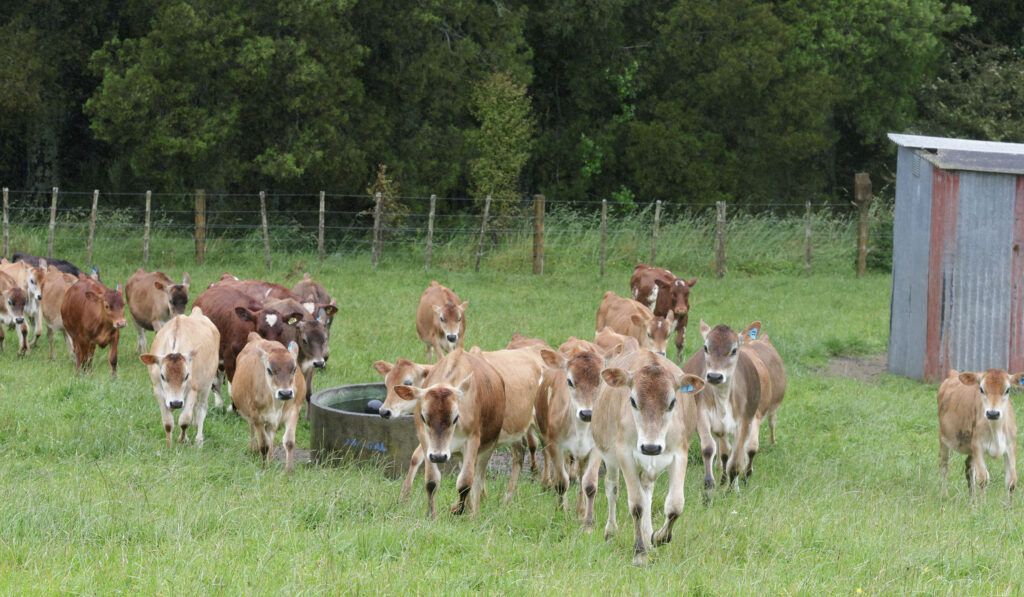
Whitford.
Over winter, he on-off grazes the cows by housing the herd in an open barn to protect the paddocks from pugging during wet periods. He also uses the housing in the summer to get the cows into the shade and prevent overgrazing the paddocks.
The low input focus means the farm operates as a System 1 to 2, depending on the season, with pasture utilisation being the main focus. If the season does turn dry over summer, he does have options to increase inputs to ensure the cows maintain condition via in-shed feeding.
He starts drying off the herd in late March-early May, staging it based on cow condition and when the cow is due to calve.
He runs the heifers separately from the older cows so he can show schoolchildren how these younger cows transition from calf to being a milking cow.
Calving starts on July 10 and he keeps 30 replacement calves and approximately 20 bull calves to 100kg, which are then sold at the saleyards.
The herd is also using Allflex collars for the first time as a tool for heat detection and animal health data. Mating begins on October 1 and runs for 10 weeks. He does AI for the first five weeks then the bull is run with the herd for a further five weeks.
However, with the cows now having collars, he may review their mating plan and do AI for the entire 10 weeks.
He uses LIC’s Forward Pack semen on his cows with an emphasis on keeping the herd Jersey-based. The breed is also favoured because it performs well on the farm’s rolling to steep terrain.
Waugh hosted his first large group of schoolchildren just before Christmas with students from Manurewa and Papakura high schools visiting.
All of the two schools’ year nine students came to the farm – 70-80 students a day over two weeks.
He says the plan is for the educational programme to dovetail into contextualised learning resources.
“We are wanting to build resources using Donald’s Farm as the context so students will come out to the farm to see what we are doing and learn about farming. Then when they’re back in the classroom they’re using data/information from the farm to base their learning on, helping them to relate to it a lot better.
“They can use farming and use food as the context for their learning and that is definitely a goal we have going forward.”
The students were split into three groups during the visit. One group went on a farm tour to learn the “grass to glass” story of dairy as well as how the industry tries to mitigate its environmental footprint.
Another did practical activities developed by Horticulture NZ and the Arborists Association, teaching the students about seeds, plant growth, tree climbing and forestry. There was also a session focusing on machinery and how it is used on the farm.
The final part of the day has the students taking part in an exercise where five role models dressed in mufti clothing get asked 10 questions from the students.
The models then leave to get changed into their work clothing and while they are changing, the students have to guess what jobs they do.
Once changed, they explain their jobs to the students.
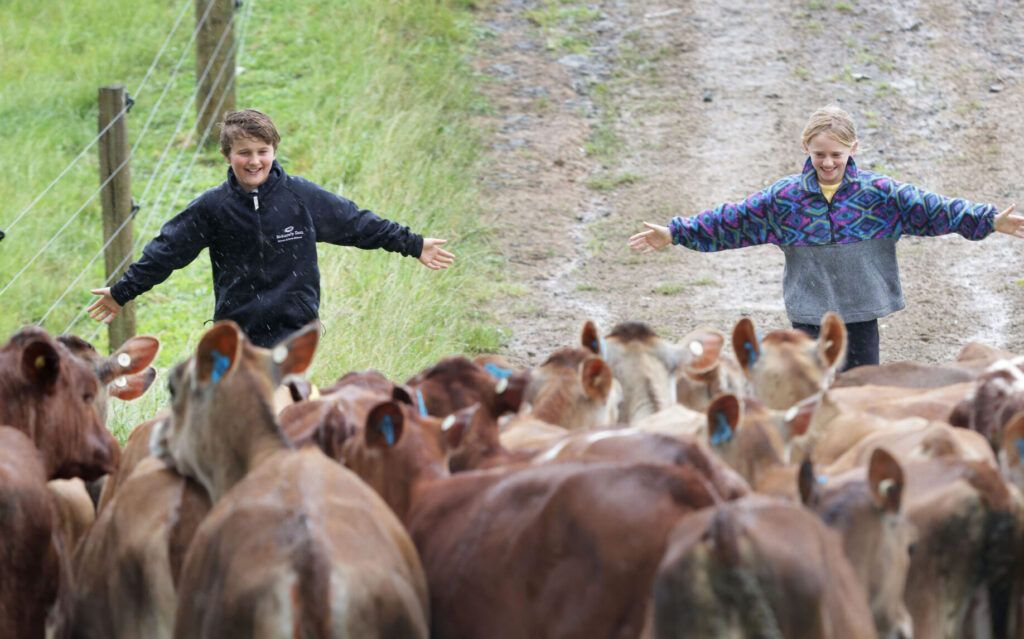
Whitford.
Waugh says they tried to get a broad spectrum of people from across the primary sector including people from Fonterra, a sheep and beef farmer, forestry, biosecurity and fishery officers, a tree nursery worker and someone from the horse-racing industry, plus many more.
“In total, we had 32 organisations involved over the two weeks from those within the primary industries through to the tertiary education commission.”
Overall, it all went a lot better than he had expected.
“We’ve had a lot of very positive feedback from all people – the role models, the teachers and the students. There was a lot of engagement from the students, a lot more than we were expecting, with Papakura High School reporting higher levels of school attendance the days the students were coming out to the farm.”
That feedback will be used to improve the programme for this year.
Waugh estimates that about 95% of the students had city backgrounds. Around 40% of the Manurewa High School students had been to a farm before, and 50-60% from Papakura High School.
There was a range of farming knowledge among the students. Most, for example, did not realise cows had to be pregnant or have recently given birth to produce milk, he says.
“But that’s what we’re trying to do. Bring that [knowledge] level up among the urban population.”
Sitting alongside the school visits are a small cluster of other educational projects. These include a trades academy and a calf club programme.
Waugh also works with Nature’s Den, a programme that sees 15-20 primary school children visit the farm and base themselves on the farm’s bush block to spend the day on outdoor learning.
“The overall concept of the farm is it to be an outdoor classroom for students of all ages,” he says.
That could one day see students in a science class take topics studied in the classroom outside for practical learning, he says.
NZYF helped him organise the day along with people from the Tertiary Education Commission and Ministry for Primary Industries.
“The plan long term is we would like to employ someone to be able to free up my time to develop and organise the educational aspect of the farm.”
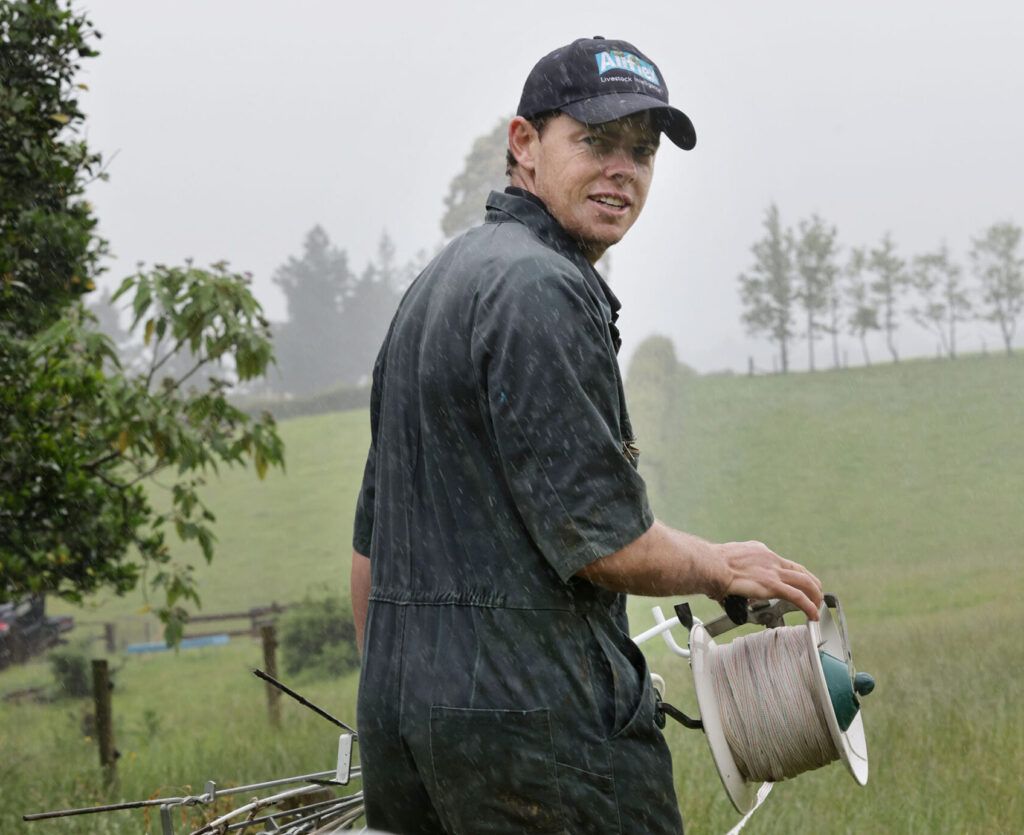
Whitford.
However, employing that person will require outside funding, which NZYF is looking into. That would also ensure the long-term financial sustainability of the teaching module, he says.
It would also take some pressure off him as he juggles the challenge of both running the farm and co-ordinating the school visits.
Keeping the educational element going will also help maintain the students’ interest. Too often in the past the primary sector has been enthusiastic about establishing one-off events to get young people onto farms but is not strong on delivering the follow-through, eroding any engagement the event might have established.
Ultimately, Waugh wants Donald’s Farm to break that mould by providing multiple interactions with students.
This will enable them to gain a deeper understanding of the broader primary industries, helping them to better understand how food is grown and highlighting the career opportunities within primary industries.
“We want to make sure we’re in front of mind in their thinking and showcase the primary industries as an exciting career opportunity for them.”
